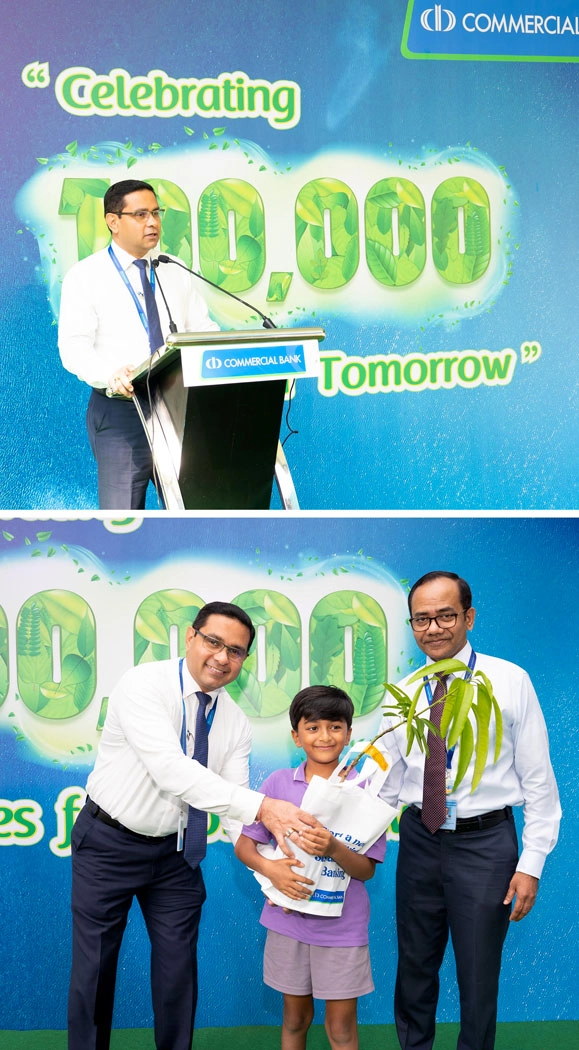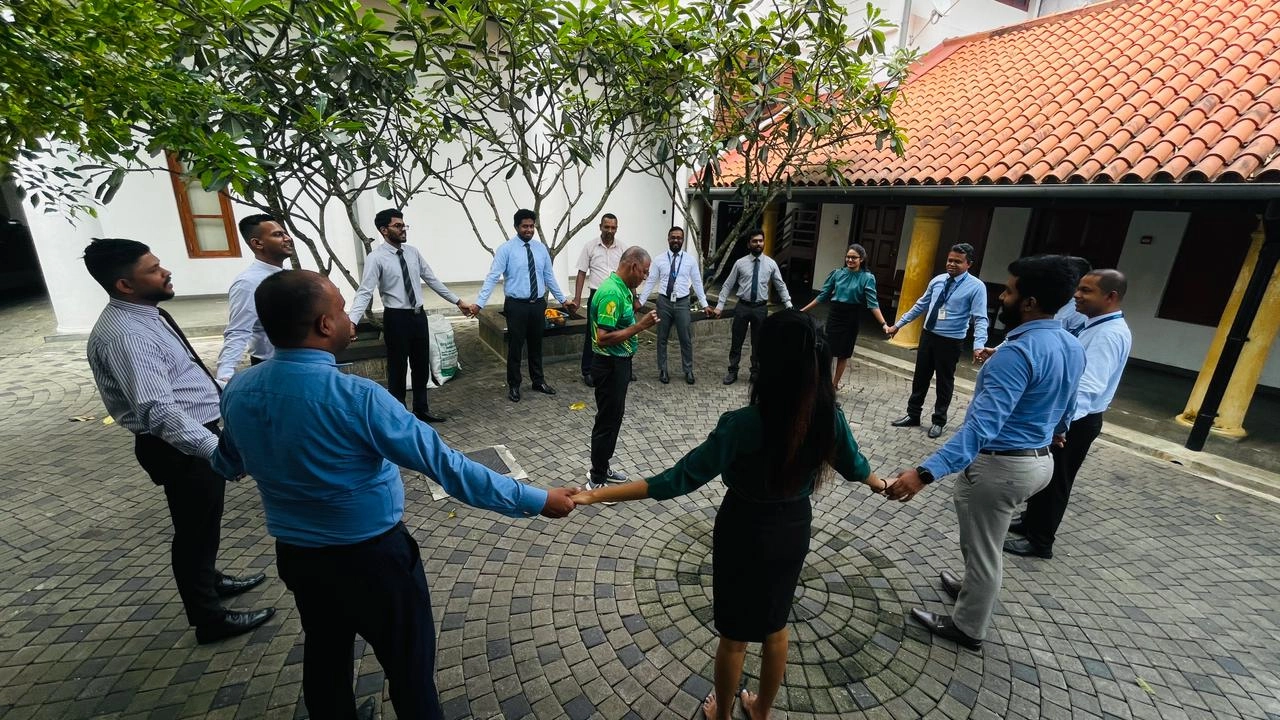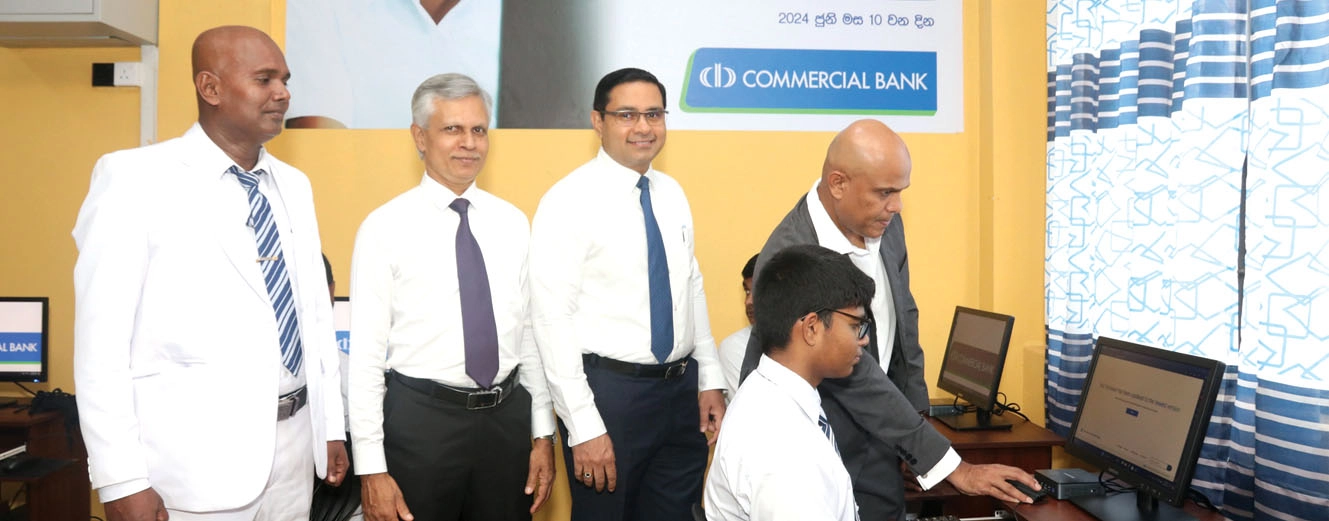My Report


Integrated Report
Management discussion and analysis

Community Engagement
Managing Director/Chief Executive Officer's and Chief Financial Officer's Statement of Responsibility
Independent Assurance Report - Internal Control
Empowering lives and creating shared value Figure - 37
Empowering lives and creating shared value
Commitment to community engagement
At Commercial Bank, community engagement is a cornerstone of our Sustainability Framework, reflecting our unwavering commitment to inclusivity, environmental stewardship, and socio-economic progress. Backed by a robust governance framework (see Table 21 on page 139), this pillar encompasses three sub-pillars: Environmental Engagement, Social Engagement, and Social Enterprise. Together, they drive our mission to deliver long-term benefits to underserved communities while contributing to Sri Lanka’s national goals and global sustainability targets.
Strategic partnerships and impact in 2024
In 2024, our community engagement initiatives were marked by strategic partnerships, innovation, and measurable impact. Collaborating with esteemed organisations such as the Janarukula Women’s Society, we addressed grassroots-level challenges through programs that empowered communities, promoted environmental sustainability, and fostered economic resilience. Among the year’s highlights were the completion of our “100,000 Trees Initiative”, engagement with the IFC to develop a Climate Transition Plan for the Bank, and the execution of over 300 volunteer initiatives, all of which exemplify our holistic approach to creating meaningful change.
Environmental engagement
Environmental Engagement focused on addressing critical ecological challenges such as marine pollution, deforestation, and climate resilience. Flagship projects included mangrove conservation, coral reef restoration, and the expansion of our reforestation efforts, which contributed significantly to carbon sequestration and biodiversity. These initiatives were complemented by our commitment to green finance, with products like renewable energy loans and climate-smart agriculture financing aligning customer solutions with environmental goals. In addition, by prioritising digital banking, we reduced resource consumption, minimised emissions, and streamlined banking processes, delivering greater efficiency and convenience for customers.
Social engagement
Social engagement initiatives centered on education, healthcare, and cultural preservation. We prioritised underserved communities by establishing IT labs, STEM classrooms, Math Labs and vocational training programs, equipping over 200,000 students with the tools needed to succeed in a technology-driven world. Healthcare efforts included donations of critical medical equipment and clean water solutions, while cultural restoration projects reinforced Sri Lanka’s rich heritage. To further drive inclusion, we empowered women and marginalised groups through skill development, targeted financial products, and structured training.
Social enterprise and entrepreneurship
Creating avenues to the marginalised or disadvantaged groups to earn revenue through their endeavours and to fund their social causes while differentiating them from charities, the Bank strategically supports social enterprises, collaborating with organisations like IFC, Sarvodaya and UNDP to empower marginalised communities by establishing initiatives such as childcare centers and donating food dehydrating machines, aiming to balance financial success with meaningful societal and environmental impact.
These efforts not only contributed to Sri Lanka’s 2030 SDG targets but also aligned with our strategic goal to become a Net Zero bank by 2050. By educating stakeholders on green finance opportunities, advancing digital transformation, and reducing operational costs through energy and resource conservation, we delivered both environmental and financial value. A robust governance framework, executed by the Sustainability Working Committee, ensured accountability, with sustainability oversight by our Executive Sustainability Committee and progress reported to the BIRMC.
As we look ahead, we aim to deepen our impact by scaling awareness efforts, fostering stronger partnerships, and addressing challenges such as regulatory complexities and resource constraints. With a focus on innovation and inclusivity, we remain committed to building a resilient, sustainable future for Sri Lanka, reinforcing the intrinsic link between our success as a financial institution and the well-being of the communities and environments we serve.
Key highlights
- Completed the 100,000-tree planting initiative.
- Conducted over 300 volunteer initiatives.
- Focused on the high-impact integration of ESG into core products and services.
Elements of community engagement Figure – 38
Community engagement
Environmental engagement
Stakeholders
engaged
Society and environment
Capitals
addressed
Natural capital
Community engagement
Social engagement
Stakeholders
engaged
Society and environment
Capitals
addressed
Social and relationship capital
Community engagement
Social enterprise
Stakeholders
engaged
Society and environment
Capitals
addressed
Social and relationship capital
Governance and impact assessment of CSR initiatives
The Bank’s commitment to Community Engagement is underpinned by a robust governance framework and a focus on measurable outcomes. By embedding accountability and transparency into its initiatives, the Bank ensures that its Corporate Social Responsibility (CSR) efforts deliver tangible and meaningful results while aligning with its overarching sustainability goals and global frameworks such as the SDGs.
Governance Framework in place at the Bank for Community Engagement Table – 21
| Governing body | CSR Trust |
Executive Sustainability Committee |
| Managed by | A dedicated CSR Unit headed by a Chief Manager consisting of a four member team |
Sustainability Working Committee comprising members of Corporate Management and Heads of 16 Departments |
| Process followed | Highly efficient project management process, including a rigorous approach to selection of projects based on feasibility, impact assessment coupled with managed resource allocation and continuous monitoring of ongoing projects |
|
| Membership | Future Force Members and ownership at branch and department level |
|
Oversight of the CSR Trust
The Bank’s CSR initiatives are governed by the Commercial Bank Corporate Social Responsibility Trust (CSR Trust), which serves as the custodian of the Bank’s sustainability and community engagement agenda. Operating under a structured framework, the Trust ensures strategic alignment, effective resource management, and optimal impact delivery. This is achieved through:
- Board of Trustees oversight - The CSR Trust is overseen by a Board of Trustees comprising members of Corporate Management and the Board of Directors, including the Chairman and the MD/CEO. This ensures that all initiatives are aligned with the Bank’s corporate objectives and the Sustainability Framework.
- Strategic fund allocation - CSR resources are allocated to priority areas such as education in particular and healthcare, environmental conservation, and community development. This ensures the optimisation of funds for long-term, high-impact projects.
- Alignment with global standards - The CSR Trust ensures that all initiatives align with international sustainability frameworks such as the SDGs, contributing to broader socio-economic and environmental goals.
Transparency and accountability
Transparency and accountability in relation to the activities of the CSR Trust are upheld through stringent processes, including annual external audits conducted by independent auditors to validate compliance with objectives of the Trust, provisions of the Trust Deed and ensure proper fund utilisation. Additionally, comprehensive reporting mechanisms provide regular updates on CSR activities, outcomes, and resource utilisation to the Trustees and other stakeholders, reinforcing trust and demonstrating a commitment to responsible resource management.
Impact assessment
To evaluate the effectiveness of its CSR programs, the Bank employs well-defined metrics and periodic assessments that help track progress and refine initiatives. This approach is structured around key focus areas, including:
- Defined metrics for assessment, which help quantify the success of various programs:
- Education: The impact is measured through the number of schools supported, IT labs and STEM classrooms established, and students benefiting from programs such as coding clubs and the Ganitha Saviya initiative.
- Healthcare: Effectiveness is assessed by tracking the volume of medical equipment donated, clean water solutions installed, and the reach of health awareness campaigns.
- Environmental programs: Progress is evaluated based on the number of trees planted, beaches cleaned, mangroves restored, and carbon offset achieved.
- Project impact assessments, which involve periodic evaluations, often conducted with third-party technical assistance, to measure the long-term benefits of CSR initiatives. These assessments provide insights into how programs enhance beneficiaries’ quality of life and contribute to environmental sustainability.
- Continuous improvement, where insights gained from assessments are used to refine strategies, ensuring that the Bank’s CSR efforts remain relevant, efficient, and aligned with community needs.
By combining a robust governance framework, rigorous impact assessments, and alignment with global sustainability standards, the Bank ensures its CSR initiatives are transparent, effective, and transformative. The CSR Trust plays a pivotal role in creating lasting value for communities and reinforcing the Bank’s position as a leader in sustainable community engagement.
Looking ahead
The Bank increased its contributions to the CSR Trust, as permitted by the provisions of the Trust Deed, enabling the Trust to expand its reach and positively impact more Sri Lankans. Recognising the potential to collaborate with organisations that allocate funds for socio-economic development but require reliable frameworks for fund disbursement, the CSR Trust will actively seek partnerships and leverage its robust governance structure to facilitate impactful initiatives. As the Bank continues to scale its community engagement efforts, it remains committed to enhancing governance mechanisms and strengthening impact measurement practices.













